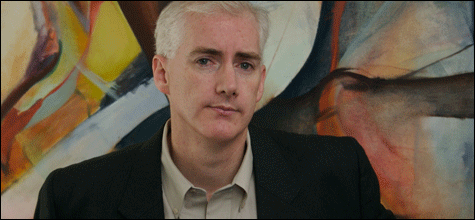
RESTLESS WRITER Walsh.
William Walsh first wrote Without Wax: A Documentary Novel as a short story about a young man caught up in the world of triple-X adult films while an undergraduate 20 years ago at Stonehill College. His cartoonishly endowed hero was pretty much the same, especially in being based in emotional realism, a kid just trying to survive.
“I wanted someone who was sort of thrust into this world, based on circumstance rather than a need for attention or a drive to be part of that world,” Walsh says, sitting over a cup at the Coffee Exchange. “So if he were passively brought into that world, he would be a more sympathetic character.”
He used the prototype for
Without Wax as well as other stories in his portfolio to get into grad school, earning an MA in writing at the University of New Hampshire. (Walsh’s day job now is at Brown University, where he is an administrator in the development department.)
The book wasn’t exhaustively researched. Walsh didn’t interview people in the pornography industry, for example. He did read some first-person biographies years ago, getting an idea of the production details and what it’s like being in a room making one of those films. The charm of the novel comes from what people think rather than the sexual calisthenics some of them accomplish.
“My own view, I think, is based on impressions from when I was younger, because I didn’t really encounter it in my daily life since I was in college,” he says. “I don’t think it’s something you have to examine closely in order to write about it.
“A few years ago I read some of the trade magazines, just to make sure I had the lingo down,” Walsh adds. “I was more interested in that part of it. I tried to minimize the amount of pornography that’s on display in the book, just to focus on how it’s produced and who’s doing it, and then how people respond to it.”
He wrote a short script for an adult film and included it in the novel, to get the mechanics out of the way. “Then the rest of it wouldn’t have to focus as much on the actual ac-tive making a film, how it’s made,” he says.
Along with everyone who has seen more than a generation of change in this country, Walsh has been struck with the increased acceptance of pornography here. What once could bring lengthy jail time for distributing is available now on cable in most motel rooms.
“It’s just out there,” he says. “Especially with the younger generation of buyers: it’s on in dormitory rooms all the time, constantly playing and everyone’s exposed to it. So it’s not something that’s tucked away or locked up in someone’s foot locker. I think that’s changed since I started writing it.
“That’s all about the whole consumer culture that I wanted to write about,” he notes.
Walsh doesn’t like writing things the easy way, and not just when he restricts himself to a documentary format in writing a novel. In February, Keyhole Press is publishing a short, 45,000-word book that — since meta-fiction has been done to death — could be called meta-nonfiction. Questionstruck assembles texts from questions in numerous books by Calvin Trillin — with his bemused permission. (This isn’t all that odd for him if you know that he once amassed a compilation of every sentence in Ulysses that referred to the potato that Leopold Bloom carries around with him as a talisman. Walsh likes playing within limitations.)
A year or so after that publication, a short story collection will be coming out. And by then, a novel he is one-third through writing will probably be done. It takes the family in the late 1960s TV series The Big Valley, and thrusts them into the 20th century. “Instead of being a Western, it’s set in Providence in a family-owned strip club,” Walsh says.
If the emphasis on character development in Without Wax is any indication, it looks like that novel will be about more than pole dancing.